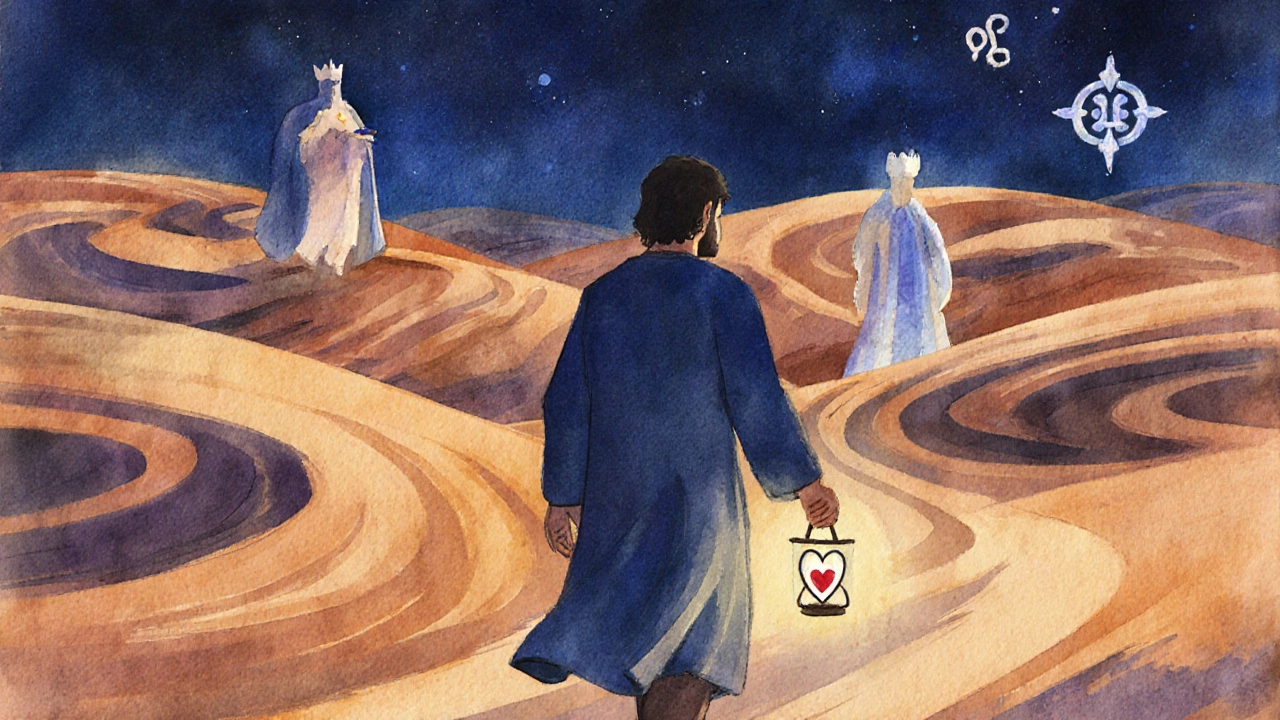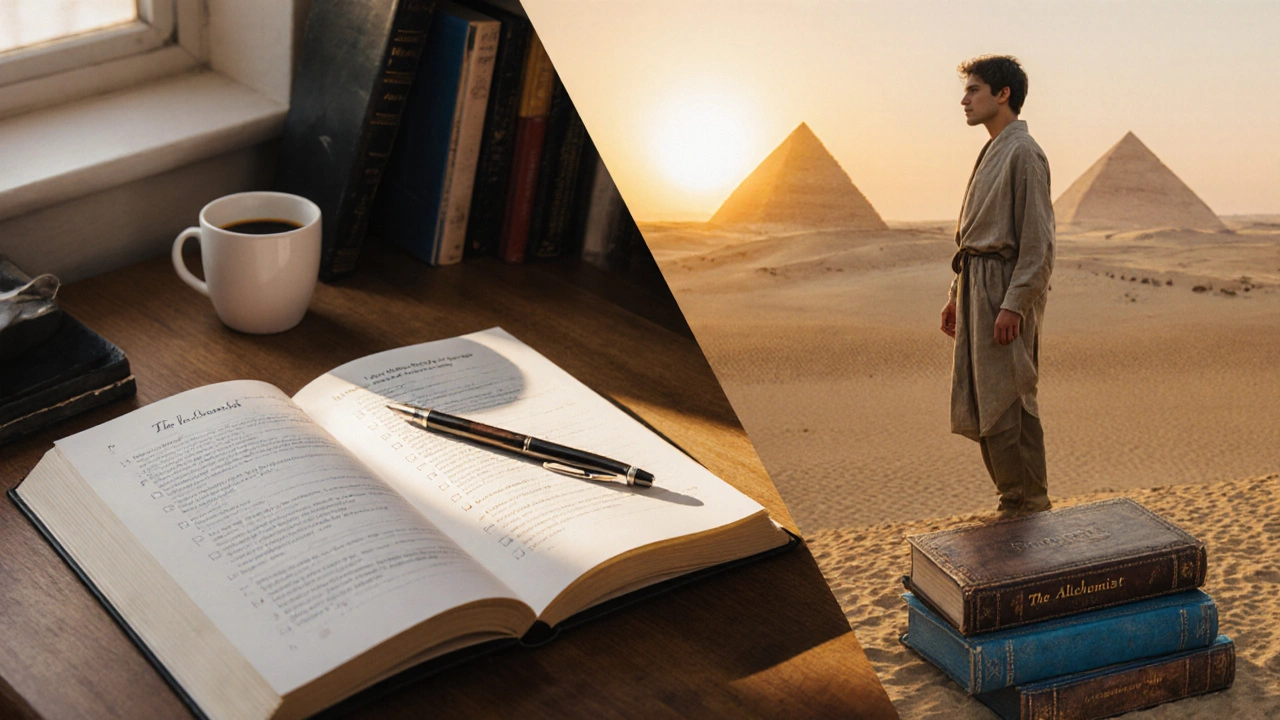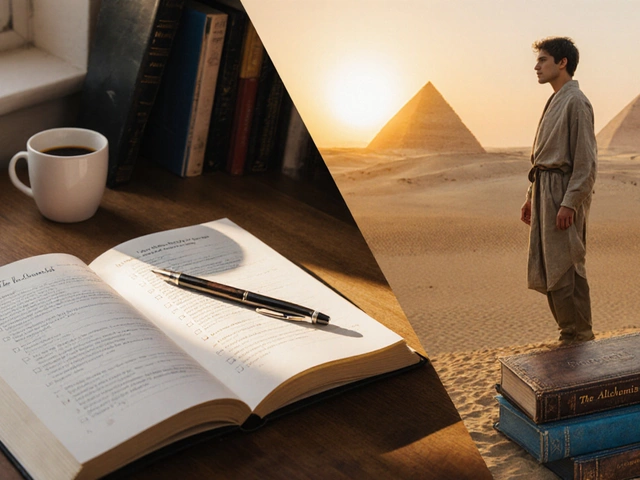Is The Alchemist a Self-Help Book? Quiz
About This Quiz
This interactive quiz helps you understand whether The Alchemist qualifies as a self-help book by examining its narrative structure, thematic elements, and approach to personal growth.
Your Results
Key Takeaways
- The Alchemist blends literary fiction with personal‑development ideas, but it isn’t structured like a traditional self‑help book.
- Its core message-following your "Personal Legend"-mirrors many self‑help principles.
- Readers can apply its allegorical lessons to real life, though the narrative format demands a different reading approach.
- Understanding the genre differences helps you decide how to use the novel for growth.
- Pairing The Alchemist with classic self‑help titles can create a well‑rounded personal‑development reading list.
What Makes a Book a Self‑Help Book?
Before we label The Alchemist, let’s nail down what a self‑help book actually is. In simple terms, a self‑help book provides direct, actionable advice aimed at improving a specific aspect of the reader’s life-whether that’s productivity, confidence, relationships, or finances. Typical features include:
- Clear, step‑by‑step frameworks or exercises.
- Author’s authority or personal experience presented as a guide.
- Practical tips you can apply immediately after each chapter.
- Goal‑oriented language that drives the reader toward a measurable outcome.
Genres like personal development, motivational literature, and even some spiritual texts share these traits, but the presence of concrete action plans is the hallmark.
Introducing The Alchemist is a novel by Paulo Coelho that follows a shepherd boy’s quest for a hidden treasure
First published in 1988, The Alchemist quickly became a global sensation, translated into 80+ languages and selling over 150 million copies. The story follows Santiago, a young shepherd from Andalusia, who dreams of discovering a treasure near the Egyptian pyramids. Along the way, he meets a king, an alchemist, and a series of symbolic figures that push him to explore the deeper meaning of his own “Personal Legend.”

Who Is Paulo Coelho?
Paulo Coelho, a Brazilian lyricist turned novelist, gained worldwide fame with The Alchemist. His background blends spirituality, travel, and a love of storytelling-elements that seep into his prose. He often describes his writing process as a channel for universal truths, which explains why many readers feel the book is more than just a story; they see it as a guide for personal insight.
Core Themes That Overlap with Self‑Help
The Alchemist’s appeal as a “self‑help” candidate lies in its recurring motifs:
- Following your Personal Legend: The idea that each person has a unique purpose aligns with the self‑help emphasis on discovering your true calling.
- Listening to your heart: Encourages intuition-a frequent self‑help recommendation for decision‑making.
- Overcoming fear and doubt: Mirrors the confidence‑building exercises found in motivational guides.
- Seeing obstacles as lessons: A perspective shift similar to cognitive‑behavioral techniques.
- Trusting the universe: Echoes spiritual self‑help concepts about alignment and flow.
These themes are presented through allegory rather than direct instruction, which is the key difference.
Comparing Narrative Fiction to Classic Self‑Help
| Aspect | The Alchemist (novel) | Standard Self‑Help (e.g., "Atomic Habits") |
|---|---|---|
| Primary Goal | Tell a story that inspires reflection | Provide concrete steps to change behavior |
| Structure | Linear narrative with symbolic episodes | Chapter‑by‑chapter framework with exercises |
| Author Voice | Storyteller sharing archetypal wisdom | Expert positioning with credentials and case studies |
| Reader Action | Interpret metaphors and apply insights voluntarily | Follow prescribed habits or techniques |
| Measurability | Subjective, personal growth over time | Quantifiable metrics (e.g., habit streaks) |
Notice how The Alchemist delivers its lessons indirectly through story, while a classic self‑help guide offers a direct roadmap. Both aim for personal transformation, but the pathways differ.
Can You Use The Alchemist as a Self‑Help Tool?
Absolutely-if you treat it as a source of inspiration rather than a how‑to manual. Here’s a practical way to turn the novel into a personal‑development exercise:
- Read with intent: Keep a notebook handy. After each chapter, jot down any phrase that resonates (e.g., “When you want something, all the universe conspires in helping you acquire it”).
- Identify personal parallels: Map Santiago’s challenges to your own goals. Is there a “desert” you’re crossing? What does your “treasure” look like?
- Extract actionable insights: Convert a metaphor into a concrete step. Example: “Listening to your heart” becomes “Schedule a 10‑minute daily reflection to check in with your instincts.”
- Set a “Personal Legend” goal: Write a one‑sentence purpose statement inspired by the book, then break it into quarterly milestones.
- Review and adjust: After a month, revisit your notes and see which insights led to real change. Tweak the next set of actions accordingly.
This hybrid approach leverages the novel’s poetic power while still giving you measurable steps-bridging the gap between fiction and self‑help.

Reader Reactions: When Does The Alchemist Feel Like Self‑Help?
Many readers report that they return to The Alchemist during pivotal life moments-career changes, relationship shifts, or after a setback. In those moments, the book’s allegorical advice becomes a mental anchor. For example, a 2023 survey of 1,200 Goodreads members showed that 68% of respondents cited the novel as a “motivational boost” during a personal crisis, even though only 15% considered it a self‑help guide.
This data points to a sweet spot: the book works best as a source of inspiration, not as a step‑by‑step manual. If you’re looking for detailed exercises, you’ll likely need to supplement it with a dedicated self‑help title.
Combining The Alchemist With Classic Self‑Help Reads
To get the best of both worlds, pair The Alchemist with a more prescriptive text. Here’s a short reading combo that covers the inspirational and the practical:
- The Alchemist - for metaphor, purpose, and soulful reflection.
- Atomic Habits by James Clear - for building concrete habits that align with your “Personal Legend.”
- The Power of Now by Eckhart Tolle - for mindfulness techniques that echo the novel’s focus on present‑moment awareness.
Reading them in sequence allows you to first feel the fire of purpose, then learn how to fan that flame into daily action.
Final Verdict: Is The Alchemist a Self‑Help Book?
Short answer: No, it’s not a self‑help book in the traditional sense. Long answer: It carries many self‑help concepts-purpose discovery, overcoming fear, trusting intuition-but delivers them through allegory rather than explicit instruction. If you treat it as a source of inspiration and pair it with actionable guides, it can function as part of a self‑development toolkit.
So, whether you call it a self‑help novel, a spiritual fable, or simply a great story, the real value lies in how you apply its lessons to your own journey.
Frequently Asked Questions
Does The Alchemist offer concrete steps like a typical self‑help book?
No. The novel presents ideas through story and metaphor rather than checklists or exercises. Readers must translate those ideas into personal actions.
Can I use The Alchemist for personal development?
Yes. By reflecting on its themes-especially the concept of a "Personal Legend"-you can set meaningful goals and gain motivation, though you’ll likely need a supplemental guide for detailed planning.
How does the book differ from classic self‑help titles?
Classic self‑help books are structured around explicit advice, exercises, and measurable outcomes. The Alchemist tells a story that invites personal interpretation, making it less prescriptive.
What other books complement The Alchemist for growth?
Consider pairing it with "Atomic Habits" for habit formation, "The Power of Now" for mindfulness, and "Man's Search for Meaning" for deeper existential insight.
Is the concept of a "Personal Legend" unique to The Alchemist?
While the term is unique to Coelho’s work, the idea mirrors many self‑help principles about discovering your true purpose or calling.







